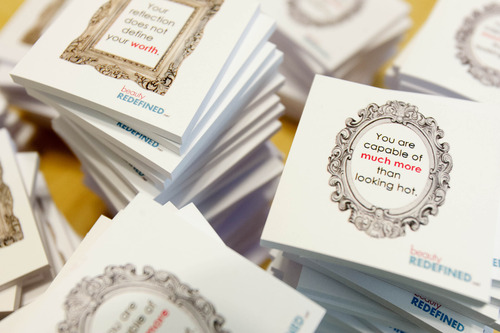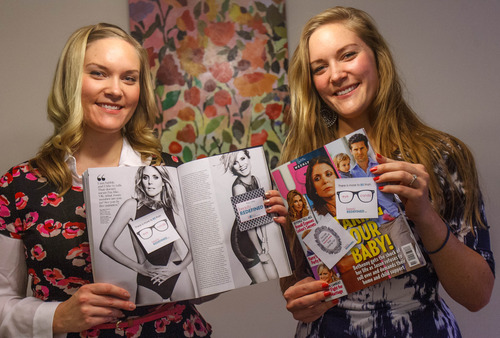This is an archived article that was published on sltrib.com in 2013, and information in the article may be outdated. It is provided only for personal research purposes and may not be reprinted.
The annual Sports Illustrated swimsuit issue hit newsstands this week as it has every year since 1964, pleasing single-issue purchasers along with 70 million print subscribers while infuriating many women's advocates.
This year, a Utah nonprofit that promotes healthy body image and positive statements for women wants to send the magazine a message.
On Monday, Beauty Redefined launched an online campaign urging supporters to cover up Kate Upton, the magazine's scantily clad cover model, with the organization's stylized sticky notes. The notes, available for purchase at http://www.beautyredefined.net, are imprinted with phrases such as "You are capable of much more than looking hot," and "There is more to be than eye candy."
Beauty Redefined, founded by twins Lindsay and Lexie Kite, began selling the sticky notes a few years ago and encouraging supporters to post them on mirrors in public restrooms and dressing rooms. The Kites, both of whom will earn doctorates in communications from the University of Utah this spring, say the words of empowerment have been extremely popular. They've sold 1,500 pads of 50 pieces each. Each pad costs $5.
But taking on S.I. is their biggest project yet.
"It's the No. 1 voice in sports journalism and yet they take very few opportunities to highlight female athletes in their regular coverage," Lindsay Kite said. "One month out of the year, the magazine is devoted solely to women, but they are posed in extremely provocative ways, the same type of positioning that's in pornography."
Lexie Kite added,"We figured that since (S.I.) is the most respected voice in sports journalism, maybe it's time to gently remind them that there's more to women than just being hot."
Sports Illustrated did not immediately return telephone messages Thursday.
—
Covering up the cover • Beauty Redefined's message resonated with fans Laura Christensen and her two daughters.
Armed with a stack of sticky notes, the trio went Wednesday night to their Sandy neighborhood Barnes and Noble store and proceeded to strategically put the notes on the magazine cover.
Christensen said the manager on duty didn't like that.
"We had worked through almost the whole stack of magazines when the manager came over and asked if we needed any help," she said.
Daughter Katie Christensen, 21, said she told him, no thanks. "Clearly, that's not the response he wanted," Katie said.
She said the manager then asked them to leave the store and followed them out.
"I am such a suburban Mormon," Laura said. "But we love Lindsay and Lexie's project. I'm very interested in making sure my daughters aren't taken advantage of."
Laura admits they had posted the notes in restrooms before, but affixing the messages to magazines felt different.
"We would never do anything illegal, but putting them on a product felt a little protes-ty," she said.
Grace Gregson, store manager of the Barnes and Noble SouthTowne Marketplace location, referred to the chain's corporate censorship policy, which states in part: "Some customers may strongly oppose the content of a particular title and choose not to purchase it. We respect their opinions. In return, we ask that our customers respect our responsibility to offer a selection of reading materials as diverse as the society in which we live, the very society that grants the freedom for these materials to exist."
She added that the manager handled the situation just the way he should have.
"Technically, they were altering the publication by putting their notes on top of the publication, so he politely informed them of the policy and they left without further incident," she said.
—
Vandalism or free speech? • So was the act of affixing a note with a message constitutionally-protected speech?
University of Utah law professor Erika George said maybe.
"You could make the case that this was private space and it's vandalism," said George. "But you could also frame it as an act of civil disobedience. That's political speech and that's protected."
And just because the speech occurred in a store does not necessarily mean it can be regulated. She cited a 1980 case, Pruneyard Shopping Center vs. Robins, where some high school students gathered petitions and handed out political leaflets. She said the U.S. Supreme Court ruled in favor of the students, arguing that there's nothing that suggests preventing their activity would impair the shop owners' right to conduct commerce.
"The courts have ruled that shopping centers are quasi-public spaces," George said. "There are so few places to have speech and there's a preference by the courts to creating public forums."
Still, if the action or speech is disorderly or disruptive to the purpose of the space — in this case, commerce — then it could be trespassing, she said. "That's when you begin to cross a line."
—
Sticky-note activism • Beauty Redefined's Lexie Kite hopes people will focus on the messages as much as what they're concealing.
"Our research shows that self-objectification is a constant thing in our society. When girls grow up seeing these images, they see themselves as objects from a very young age," she said.
She emphasized that covering up Sports Illustrated's swimsuit issue is an education campaign, not a call to destroy private property.
"These sticky notes don't leave any trace," on the magazine cover, she said.
Lindsay Kite added that other magazines with provocative images, such as Penthouse and Playboy, are required to be mailed in dark packaging.
The S.I. swimsuit issue "is just wide out in the open when people walk past the grocery checkout," Lindsay said. "If no one is going to regulate that, then we're going to take matters into our own hands. We shouldn't sit back passively." —
Beauty Redefined
Learn more about the Utah nonprofit organization's campaign at http://www.beautyredefined.net.





